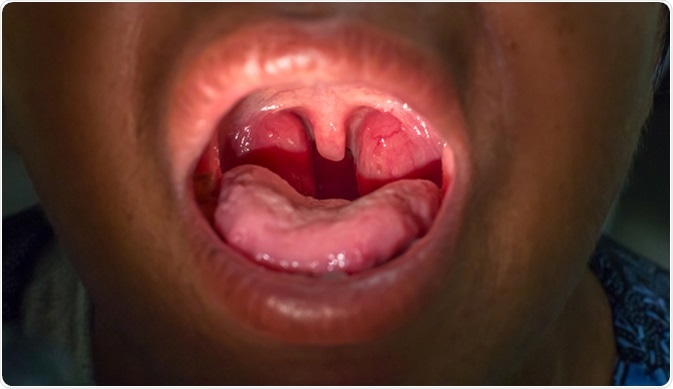Tonsils are tiny organs located at the back of our throat. They are part of the lymphatic system and play a key role in our overall health. Tonsils were earlier thought to have no function and were considered an obsolete part of the human body. When they get infected, they are usually removed by surgery. Contrary to this perception, tonsils have been shown to have important functions in the human body.

Zooming closeup view of a patient with chronic tonsillitis. Dark frame intentionally for a special aspect of picture. Image Credit: Karan Bunjean / Shutterstock
Though it is a small organ, it plays an important role in maintaining our immunity. The human tonsils help prevent foreign bodies from finding their way to the lungs, almost like how goalies work in a soccer game. Tonsils have the ability to filter microorganisms such as bacteria and viruses. The immune cells present in the tonsils produce antibodies that help destroy the germs and keep throat / lung infections at bay.
The American Academy of Otolaryngology states that these small bumps at the back of the throat act as the first line of defense in our immune system. They are considered our defense against inhaled pathogens. For instance, tonsils are said to ‘sample’ the bacteria and viruses trying to enter our body via the nose or mouth and flush them with the help of lymph. Lymph in Latin means “connected to water” and is a colorless and clear fluid.
Findings from many studies suggest that the tubal tonsils can actively transport foreign antigens, and function as inductive and effector sites within the mucosal immune system. Some study results also show that there is a functional sub-compartmentalization among different tonsillar organs and they have different roles in the immune responses that they generate.
Infection of the Tonsils
An infection of the tonsils is called tonsillitis. A very common symptom of tonsillitis is a sore throat. But it can be accompanied by other signs such as cough, headache, fever, pain while swallowing, and general tiredness. Sometimes, enlarged tonsils has pus in it and they look like white spots. Symptoms can get worse over a span of two to three days and then subside within 7 days. Viruses are the causative agents of tonsillitis in a majority of cases, while bacteria can also cause infection.
Glandular fever also called infectious mononucleosis can cause severe tonsillitis among other symptoms. This fever is caused by a virus called the Epstein-Barr virus.
Cancer of the tonsil is very rare and is mostly found in heavy smokers and alcoholics.
3D Medical Illustration of Tonsils - Tonsillitis Animation | ENT Animation
Why Remove the Tonsils?
A surgery performed to remove the tonsils is known as a tonsillectomy. If adenoids are also being removed, the surgery will then be called an adeno-tonsillectomy. It is often done during childhood but some adults also undergo this procedure. Doctors usually advise removal of the tonsils in situations such as severe and frequent infection of the tonsils that causes episodes in a year that affect normal functioning at home, work, or school. Although the removal of the tonsils does not guarantee complete prevention of throat infections, it does help bring down the number and severity of infections. The risk of developing rare conditions like Quinsy, which is a bacterial infection that causes abscesses to form near the tonsils, is also reduced after a tonsillectomy. Mostly, people who have had frequent bouts of infection in the tonsils start feeling better after the removal of tonsils.
Tonsils is also removed in cases where people have large tonsils that can obstruct the airway partially and cause a sleep disorder called obstructive sleep apnea syndrome or if a cancer of the tonsil has been diagnosed.
Tonsillectomy Complications
As with all surgeries, there is a lot of risk involved with tonsillectomy. For instance, some complications of this surgery include severe bleeding from the surgery site, infection, and anesthetic reactions.
A tonsillectomy is just as painful as other surgeries and the gains though apparent have not been quantified clearly. Hence, before having the tonsils removed, it might be best to have an open discussion and weigh the risk and benefits of tonsillectomy with the doctor including understanding details of the procedure and post-operative care and recovery.
Last Updated: Oct 25, 2018